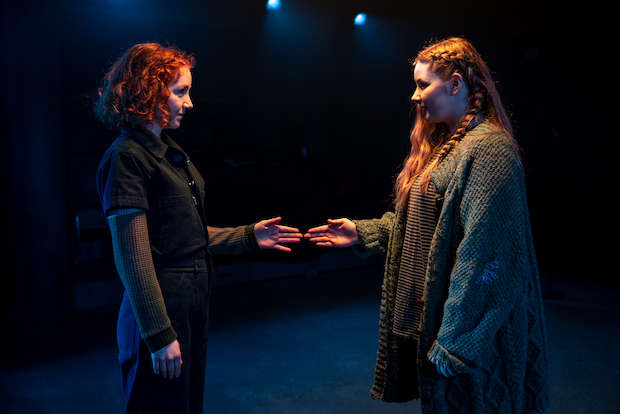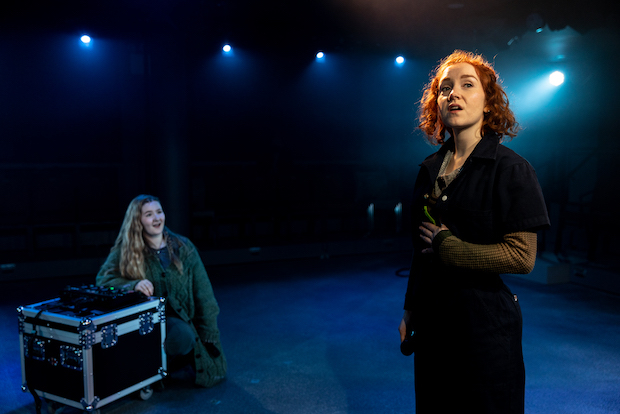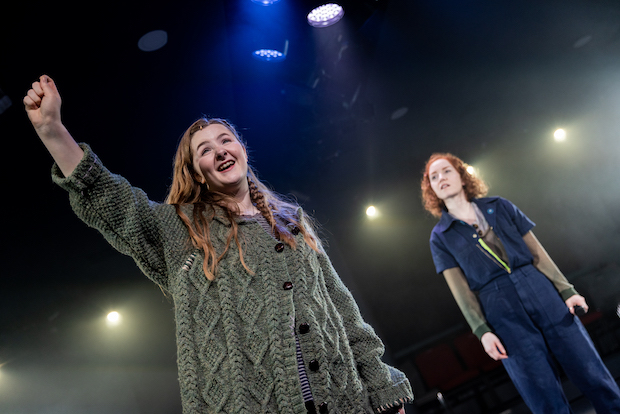Review: Islander Is a Strange and Magical Little Musical Off-Broadway
A hit of the Edinburgh Fringe opens in Midtown Manhattan.

(© Maria Baranova)
The theater has a great power, and I would argue an essential duty, to transport audiences to places they've never been, to hear voices they might not otherwise hear. Two fascinating and unfamiliar brogues can currently be heard at the rebranded Playhouse 46 (formerly St. Luke's Theatre) in Islander, a transfixing new musical set on an obscure Scottish island.
That's Kinnen, a dwindling, graying, and fictional community on the verge of extinction. The mainland government has offered a resettlement plan to the remaining residents, including the youngest, Eilidh (Bethany Tennick). As the only person her age on the island, she spends a lot of time alone, and on one of her solo walks she encounters a beached whale calf. A stranger named Arran (Kirsty Findlay) soon appears, claiming to be from an island no one has ever seen, where the residents are all shepherds — to the whales. What follows is a magical mélange of Orcadian folklore and contemporary ecological drama. It's Free Willy meets Brigadoon.

(© Maria Baranova)
Stewart Melton's subtly charming book, which cleverly declines to fully reveal the mysteries it allows us to glimpse, is set to an original score by Finn Anderson that exudes an a capella pop sensibility (think Pitch Perfect) with inflections of Enya. There is no band: All the music and sound cues are created by the two actors using their voices and a sound looper (impressive sound design by Sam Kusnetz and Kevin Sweetser). Tennick and Findlay make it all look much easier than it is.
The two performers are the driving force behind the production, easily slipping in and out of every role: There's marine biologist Jenny (an authoritative yet friendly Findlay), Eilidh's mischievous gran (also Findlay, elegantly walking the line between comedy and tragedy), and Breagha, a woman whose pregnancy promises the first infant on Kinnen in a very long time (Tennick endows this character with heart and just the right amount of sass). They are both gifted actors and they always seem to find the right note, with nary a pitch pipe in sight.

(© Maria Baranova)
Under the direction of Amy Draper (who conceived the show), Islander unfolds with a nimbleness that doesn't sacrifice clarity: A small road case on castors constitutes Hahnji Jang's set, if you don't count the sound equipment that comes out of it. Jang costumes Findlay in a jumpsuit that distinguishes Jenny and Arran as outsiders, while Tennick wears an oversized and well-worn wool cardigan that serves better than any painted backdrop or projection of the Scottish isles ever could. This is a show that uses few materials to tell a story of looming environmental catastrophe, living up to the ideals it wants to convey. It should be no surprise that it was such a hit at the 2019 Edinburgh Fringe Festival.
Happily, Islander is never didactic, suggesting its themes of climate change and personal responsibility without spelling them out explicitly. It is much more effective for the audience to reach those conclusions on our own as we ponder this enchanting story for days after. And it is a story we ought to ponder, living as we do on a small island in a big Ocean.









